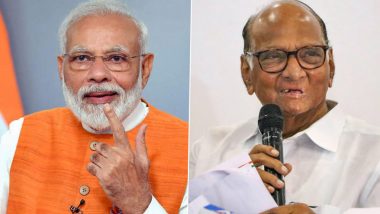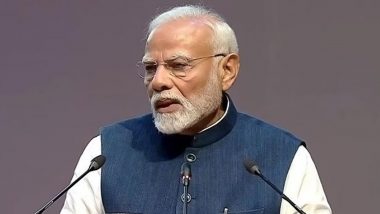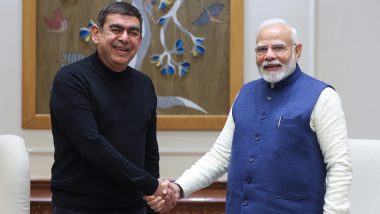Mumbai, October 28: Nationalist Congress Party president Sharad Pawar on Saturday said minimum support prices (MSPs) for food grains not only increased “exponentially” during his tenure as Union agriculture minister, but he also undertook some key initiatives that led to the rise in crop production. Pawar was responding to his criticism by Prime Minister Narendra Modi during the latter's address at a public event in Shirdi on Thursday.
“Some people in Maharashtra only did politics in the name of farmers. A senior leader of Maharashtra served as the country's agriculture minister. I personally respect him, but what has he done for farmers,” PM Modi said. Pawar served as the agriculture minister when the Congress-led UPA government was in office at the Centre (2004-14). Modi also said when Pawar was the Union agriculture minister, farmers were at the mercy of middlemen. The NCP chief said when he took charge as the agriculture minister in 2004, there was a shortage of food grains in the country. Ajit Pawar Should Have Left Dais or Corrected PM Narendra Modi After Criticism of Sharad Pawar, Says Anil Deshmukh
Pawar said the MSP for rice was “Rs 550 in 2004 which rose to Rs 1,310 by 2014, registering a growth of 168 per cent”. Similarly, MSP for crops like soybean saw a rise of 198 per cent, he claimed. The NCP leader said he undertook several ambitious initiatives for the National Horticulture Mission. He said the ‘Rashtriya Krishi Vikas Yojana' transformed the agriculture sector. He said that earlier Punjab, Haryana, western Uttar Pradesh and some states of south India were known for food grains. However, the production of rice in states in the northeast, Chhattisgarh, Jharkhand and Odisha rose leading to the second green revolution. PM Narendra Modi Lays Foundation Stone of Multiple Projects Worth Rs 7,500 Crore in Maharashtra (Watch Video)
NCP leader and Lok Sabha member Supriya Sule had on Thursday reacted to the PM questioning Pawar's contribution to the farming community. She said it was the Narendra Modi government that had given Padma Vibhushan, the country's second highest civilian award, for his work in the agriculture sector.













 Quickly
Quickly




















